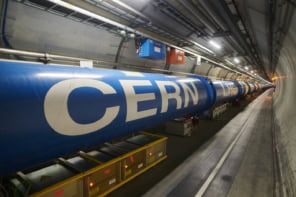The Large Electron Positron (LEP) collider at CERN, the European particle physics laboratory, will have to close two weeks earlier than planned in 1999 and 2000 for financial reasons. The collider will then be shut down to make way for the Large Hadron Collider (LHC), which will become the world's leading high-energy accelerator. However, if LEP makes a major discovery in the next two years, the LHC will be delayed to allow LEP to run again in 2002. High-energy physicists hope to find the Higgs particle or evidence for supersymmetry at the collider. Operation of LEP in 2001 will not be possible due to the construction of the LHC.
With a collision energy of 189 GeV, LEP is currently the world’s highest energy electron-positron collider. It was originally due to be shut down at the end of this year, but physicists working at the facility successfully lobbied to have its life extended and its energy increased to 200 GeV. The extension is to be funded by a series of ‘special contributions’ from CERN’s member states. The collider is scheduled to run for 169 days in 1999 (the same as this year) and 156 days in 2000.
However, some member states – such as the UK – have not provided these extra funds, while there are concerns about the ability of Greece and Poland to pay their regular subscriptions. Sweden’s subscription also remains uncertain in the run-up to the Swedish national elections. “If all the money is not found from further contributions then a further strain will come on CERN finances, ” says Roger Cashmore, the Oxford University physicist who will be director of collider programmes at CERN from next year.



